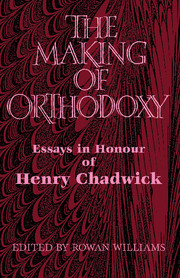Book contents
- Frontmatter
- Contents
- Preface
- List of abbreviations
- Bibliography of Henry Chadwick
- Does it make sense to speak of pre-Nicene orthodoxy?
- ‘And I have other sheep’ – John 10:16
- Reason and the rule of faith in the second century ad
- Adam in Origen
- Panegyric, history and hagiography in Eusebius' Life of Constantine
- Matthew 28:19, Eusebius, and the lex orandi
- The achievement of orthodoxy in the fourth century ad
- Eunomius: hair-splitting dialectician or defender of the accessibility of salvation?
- Some sources used in the De Trinitate ascribed to Didymus the Blind
- The rhetorical schools and their influence on patristic exegesis
- Pelagianism in the East
- The legacy of Pelagius: orthodoxy, heresy and conciliation
- Augustine and millenarianism
- Divine simplicity as a problem for orthodoxy
- The origins of monasticism
- Artistic idiom and doctrinal development
- Index of modern names
- Index of ancient and medieval names
- Index of sources
Eunomius: hair-splitting dialectician or defender of the accessibility of salvation?
Published online by Cambridge University Press: 08 October 2009
- Frontmatter
- Contents
- Preface
- List of abbreviations
- Bibliography of Henry Chadwick
- Does it make sense to speak of pre-Nicene orthodoxy?
- ‘And I have other sheep’ – John 10:16
- Reason and the rule of faith in the second century ad
- Adam in Origen
- Panegyric, history and hagiography in Eusebius' Life of Constantine
- Matthew 28:19, Eusebius, and the lex orandi
- The achievement of orthodoxy in the fourth century ad
- Eunomius: hair-splitting dialectician or defender of the accessibility of salvation?
- Some sources used in the De Trinitate ascribed to Didymus the Blind
- The rhetorical schools and their influence on patristic exegesis
- Pelagianism in the East
- The legacy of Pelagius: orthodoxy, heresy and conciliation
- Augustine and millenarianism
- Divine simplicity as a problem for orthodoxy
- The origins of monasticism
- Artistic idiom and doctrinal development
- Index of modern names
- Index of ancient and medieval names
- Index of sources
Summary
When I began the study of theology, I did not at first find patristics a particularly attractive branch of the subject. The Trinitarian and Christological controversies, which bulked so large in those initial studies, seemed to me to be a prime example of those ‘strifes of words’ (or logomachiai, to give them their more forceful Greek expression) against which the author of the Pastorals warns us (1 Timothy 6:4). The first step in acquiring a basic sympathy with what was going on in those controversies, essential to any serious engagement with, let alone understanding of, them, was to see how closely they were felt to impinge on the issue of salvation. That is one of the many insights for which I am indebted to Henry Chadwick. So when in my first book I included the sentence ‘The concern about Christology was not a barren intellectual concern; it was intimately connected with a concern about soteriology’, I gave the sentence a justifying footnote consisting of a reference to an article by Henry Chadwick. In that article, ‘Eucharist and Christology in the Nestorian Controversy’, he not only emphasizes the soteriological rather than psychological nature of Cyril's concern for the unity of Christ, but also brings out how Cyril's eucharistic doctrine ‘strikes at the heart of Nestorius' soteriology’. Soteriological concerns were central to both sides of that debate. Few scholars today would enter on any discussion of those fourth- and fifth-century Christological controversies without that recognition as a basic element in their approach.
- Type
- Chapter
- Information
- The Making of OrthodoxyEssays in Honour of Henry Chadwick, pp. 157 - 172Publisher: Cambridge University PressPrint publication year: 1989
- 4
- Cited by

